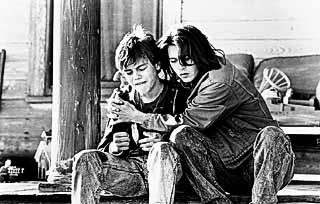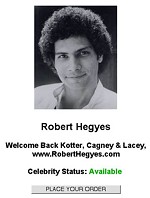Strength of Character
Peter Hedges Tells the Stories He Wants to Tell
By Sarah Hepola, Fri., Oct. 6, 2000

Peter Hedges writes stories about the people that Hollywood forgot: like the mother so large there is no household scale that can weigh her; or the beautiful woman head over heels for a blind man with no legs or hands; or the abandoned young boy in Iowa, who thought seven was going to be his best year yet. Like John Irving, Hedges can create characters with such depth and originality it's as if you have spent a lifetime in search of their company. And also like Irving, Hedges is a writer who fell into this "movie business" through the strength of a novel -- in this case, What's Eating Gilbert Grape, about a listless 24-year-old cracking the inertia of small-town life. "I had hardly read any novels at that point," Hedges remembers, "I just kind of barrelled ahead thinking that it needed to be the kind of story that I would want to read." He had never written a screenplay, either, but it didn't stop him from adapting the book for Swedish director Lasse Hallström (who would go on to helm Irving's best adapation, The Cider House Rules). That willingness to forge into unexplored territories has allowed Hedges to build an impressive career that includes a second novel (An Ocean in Iowa) and work in the theatre (like off-Broadway's Imagining Brad). Last year, he adapted Jane Hamilton's A Map of the World, a challenging drama about a woman accused of child abuse, starring Sigourney Weaver in a role hailed by many as the actress' finest.
I spoke with Hedges from his office in New York, where he is picking up the pace: already at work on his second novel, contemplating the adaptation of another (Michael Chabon's The Amazing Adventures of Kavalier & Clay), and sealing the deal on his first original script and directorial debut, Pieces of April. He comes to Austin next week as a panelist for the Heart of Film Screenwriters conference, eight years after he launched his screenwriting career here.
Austin Chronicle: You filmed What's Eating Gilbert Grape in and around Austin. What do you remember about that time?
Peter Hedges: One of the great kicks of having a movie made is that you envision this world. And then I showed up on the set, and they had painted the Manor watertower so it said "Endora," and they had taken a lot of stores and converted them into the stores that were the stores in the novel. So that was thrilling. One of my happiest memories actually was when [the Austin Film Society] showed a number of Sven Nykvist films [legendary cinematographer who also worked on Gilbert Grape], primarily Ingmar Bergman films. I saw Cries and Whispers, and Nykvist came and spoke afterwards and the film students just lapped up everything he had to say. And this may be my favorite memory from the whole thing -- I drove him back to the hotel, and he'd been very moved. He hadn't seen Cries and Whispers in years. And he said, [Swedish accent] "Peter, I am going to my room now and I am going to call Ingmar and I am going to wake him up and I am going to say, 'Once upon a time, we made a wonderful movie.'"
AC: I wanted to talk a little about Gilbert Grape, if you're not too tired of it.
PH: No, not at all.
AC: I love the dramatic moments set around these small-town events -- Gilbert walking into FoodLand for the first time and the day the Burger Barn arrives. It's one of the first movies I can remember that was openly skeptical of food courts and strip malls, although since then, there's been such a backlash against places like Barnes & Nobles taking over every neighborhood. But in watching the film again, I got a sense that the people in Endora really love those places, that they deserve them.
PH: You know, it's a real battle. I do think the people in smaller towns are yearning for some of the comforts of what larger communities have. It's a real dance with the devil, because we want all the perks in life, and yet we want to keep our individuality. As individuals and as communities. When I was writing this book, I think I felt that everything interesting in America was getting stomped out, and that was certainly something Gilbert felt very strongly about. I'm glad those parts resonated for you. They're important parts to me.
AC: I'm also a big fan of Johnny Depp. But I was reading comments online yesterday, and one thing that came up a few times from fans of your book was that they thought he was miscast.
PH: Really? I think he's terrific in the film. The hard aspect of translating the novel to the movie was that all of Gilbert's best material was internal. All of his humor, all of his point of view. ... I don't know what to say to those people. I think the performance is really, really beautiful. Very subtle. Very human.
AC: But I guess the thing that's remembered most is Leonardo DiCaprio's performance [as Arnie Grape, Gilbert's retarded brother]. It must have been strange for you to watch his rise.
PH: Well, we knew. I mean, who would have known for that period of time he'd be the biggest star in the world? But there was no question that this kid was going to be really something special. I think he's a much better actor than maybe some people realize. I think he's terrific in Titanic, too, but it's different. If you can nail an Arnie Grape, people are going to view you as a great actor. That brings us back to Johnny. I mean, I think it's harder for people to understand that that's the harder performance to give than the performance that Leonardo gave, which I'm not saying was an easy performance. But those performances tend to be flashier.
AC: And he also got nominated for an Academy Award for the role -- one of those Oscar clichés about playing someone who's handicapped. So what else did you learn about Hollywood and the process of screenwriting during that adaptation?

PH: Lasse [Hallström] had a very acute sense of when my writing might be making fun of people. Now Gilbert, of course, in the novel, is making fun of most everyone. But Lasse argued, and I think accurately, that you cannot make fun of people the way Gilbert makes fun of people on film. You will turn them into two-dimensional clowns. We might laugh with them, we might even laugh at them. But ultimately, we would understand them. My writing since then is more textured and human.
AC: The characters in Gilbert Grape and then A Map of the World strike me as very unusual Hollywood characters.
PH: They're human and they're hopefully full of, you know, delicious contradictions. Have you seen Map of the World?
AC: I did. I'm sort of embarrassed to say I just saw it last night.
PH: Well how could you have seen it? It wasn't in the theatre but a moment. So how did it play?
AC: I found it totally compelling. But I was puzzled by it. I was puzzled by Sigourney Weaver's character. I had mixed feelings about her.
PH: Well, you know, I do too. I feel like I'm missing the moment where I really feel she's sorry. There's a speech where she says, "I'm sorry for this, I'm sorry for that ..." A very bold choice was made to play it kind of unrepentant. I think for some people it's very hard to sympathize with her. What I love about the character in the story is that she pushes our tolerance. The novel is so terrific. And I think a movie has to do in a very short period of time what a novel can take a long time to do. While the adaptation is very faithful, you don't maybe get as much compassion for her in the movie as you do in the book. And I think the movie suffers a bit for that, and I'm partially to blame.
AC: Why did you choose that project?
PH: For me, it was the story about a marriage enduring the unthinkable. And I think there are very few great stories told about marriages being tested. I think they're harder stories to write than stories about people meeting and falling in love -- those stories are more fun. But how do you survive unthinkable things? How do you move on after you make mistakes? It just seemed to me to be about things that mattered to me -- the fragility of life.
AC: Were you disappointed by the response to it?
PH: What happens with a movie like that is -- you need a break. If Leonardo DiCaprio had not been nominated for an Academy Award, they would have buried What's Eating Gilbert Grape. In fact, they did. Gilbert Grape opened in December, and it had not appeared in more than 30 theatres by March. This is the dilemma of the smaller, character-based movie. The difference, of course, is that Gilbert Grape leaves you feeling renewed and hopeful, and I think Map of the World ... it's hard for people who work 50, 60-hour weeks to go watch a movie about a kid drowning. And I don't think that makes it unimportant. Ultimately what I try to do is work on stories I love with people I admire, and sometimes they get made and sometimes they don't.
AC:Since this is a screenwriter's festival and I know there will be a lot of people trying to pick your brain, I'm curious: What kind of lessons do you like to impart to young writers?
PH: The biggest thing would be this: There's a real impatience. Everyone's in a hurry. I just know a lot of people who start writing and they think, you know, within a year or two they're gonna write something amazing. Writing a really good screenplay is not easy. It can be a very punishing form. And I had a great teacher -- Sanford Meisner, who was (along with Lee Strasberg and Stella Adler) one of the three great acting teachers of this century. He said that anything worth doing well will take you 20 years to learn. And he looked at me, and he said, "Peter, in your case, maybe 21." It was a joke, and, of course, I laughed, and my heart broke. But I believe it to be true. It goes against all of the notions of our time, which are -- you can make money fast, you can acquire knowledge quickly.
AC: And specifically Hollywood, where you hear about people being washed up at 30.
PH: But I think maybe if we altered our expectations of ourselves and set ourselves on a timeframe that was more respective to how long it does take to actually learn something deeply, then people wouldn't be washed up at 30. There's no reason that a writer, if they have some discipline and curiosities and passion, can't be vital for a long, long time. A number of my mentors as screenwriters are in their 70s and early 80s. They've had full careers. They know so much. They still have so much to say. And the other thing I suppose I would tell a young writer is -- find the story you have to tell and not the story you think they want you to tell. ![]()










